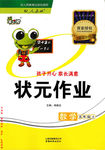题目内容
Father gave me a gold watch, were made of small diamonds.
A.the hands of whom B.whom the hands of
C.which the hands of D.the hands of which
D

 优百分课时互动系列答案
优百分课时互动系列答案 开心蛙状元作业系列答案
开心蛙状元作业系列答案When I was seven, my father gave me a Timex, my first watch. I loved it, wore it for years, and haven’t had another one since it stopped ticking a decade ago. Why? Because I don’t need one. I have a mobile phone and I’m always near someone with an iPod or something like that. All these devices (装置) tell the time — which is why, if you look around, you’ll see lots of empty wrists (手腕); sales of watches to young adults have been going down since 2007.
But while these wise people have realized that they don’t need them, others — including some distinguished ones of our time — are spending total fortunes on them. Brands such as Rolex, Patek Philippe and Breitling command shocking prices, up to £ 250.000 for a piece.
This is ridiculous. Expensive cars go faster than cheap cars. Expensive clothes hang better than cheap clothes. But these days, all watches tell the time as well as all other watches. Yes, you may say expensive watches will come with some extra functions — but who needs them? How often do you dive to 300 metres into the sea to test its function of waterproof, or need to find your direction in the area around the South Pole by using its compass? So why pay that much of five years’ school fees for watches that allow you to do these things?
If justice were done, the Swiss watch industry should have closed down when the Japanese discovered how to make accurate watches for a five-pound note. Instead, the Swiss re-invented the watch, with the aid of millions of pounds’ worth of advertising, as a message about the man —— usually a famous star, wearing it. Rolexes are for those who spend their weekends climbing icy mountains; a Patek Philippe is for one from a rich or noble family; a Breitling suggests you like to pilot planes across the world.
Watches are classified as “investment items” (投资项目) now. A 1994 Philippe recently sold for nearly £ 350, 000, while 1960s Rolexes have gone from 15, 000 to 30, 000 plus in a year. But, to some wealthy people, a watch is more than an investment. It’s a valuable toy for self-satisfaction, a matter of fashion. Prices may keep going up — they’ve been rising for fifteen years. But when fashion moves on, the owner of that £ 350, 000 treasured object will suddenly find his pride and joy is no more a good investment than my childhood Times.
【小题1】The sales of watches to young people have fallen because ______.
| A.they have other devices to tell the time |
| B.they think watches are too expensive |
| C.they have little sense of time now |
| D.they prefer to wear an iPod on their wrists |
| A.some people often dive 300 metres deep into the sea |
| B.expensive clothes sell much better than cheap ones |
| C.cheap cars usually don’t run as fast as expensive ones |
| D.expensive watches with unnecessary functions still sell |
| A.It targets rich people as its potential customers. |
| B.It seems hard for the industry to beat its competitors. |
| C.It wastes a huge amount of money in advertising. |
| D.It is easy for the industry to re-invent cheap watches. |
| A.Timex Being better than Rolex |
| B.My Expensive Childhood Timex |
| C.Super-level Watches? Not for Me! |
| D.Watches — a Valuable Collection |
Why do people drink too much, eat too much, smoke cigarettes or take drugs? What’s to blame for all the bad behavior? Most people would say that, while these self-destructive acts can have many root causes, they all have one obvious thing in common: they are all examples of failures of self-control, lacking the will power to resist them.
According to a recent study, however, if you really think about it, something about that simple answer doesn’t quite make sense. In fact, it turns out that sometimes it’s having will power that really gets you into trouble.
Think back to the time you took your very first sip (啜饮) of beer. Disgusting, wasn’t it? When my father gave me my first taste of beer as a teenager, I wondered why anyone would voluntarily drink it. And smoking? No one enjoys their first cigarette — it tastes awful. So even though smoking, and drinking alcohol or coffee, can become temptation (诱惑) you need will power to resist, they never, ever start out that way.
Just getting past those first horrible experiences actually requires a lot of self-control. Ironically (讽刺的是), only those who can control themselves well, rather than give in to them, can ever come to someday develop a “taste” for Budweiser beer, Marlboro cigarettes, or dark-roasted Starbucks coffee. We do it for social acceptance. We force ourselves to consume alcohol, cigarettes, coffee and even illegal drugs, in order to seem experienced, grown-up, and cool.
These bad habits aren’t self-control failures — far from it. They are voluntary choices, and they are in fact self-control successes. Self-control is simply a tool to be put to some use, helpful or harmful. To live happy and productive lives, we need to develop not only our self-control, but also the wisdom to make good decisions about when and where to apply it.
【小题1】What do most people think causes bad behavior?
| A.Being forced by others. |
| B.Not having enough will power. |
| C.Enjoying their first experiences. |
| D.Following the examples of their friends. |
| A.will power helps develop bad habits sometimes |
| B.drinking beer is harmful to the health of teenagers |
| C.self-control should be developed when one is young |
| D.everyone can be challenged by different temptations |
| A.without self-control, no one can succeed |
| B.bad habits don’t always lead to bad results |
| C.applying self-control correctly is important |
| D.people can develop wisdom from bad behavior |
| A.My First Sip of Beer | B.Do You Have Will Power ? |
| C.Does Will Power Benefit Us? | D.Dark Side of Self-control |
